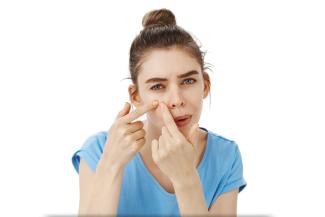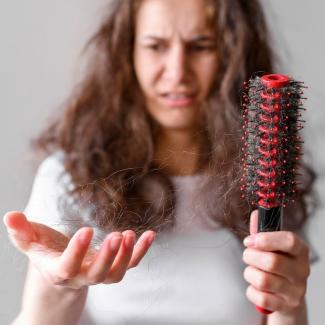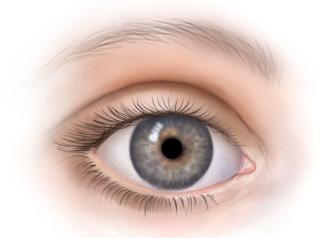
Hormonal hair loss, often referred to as androgenetic alopecia or male/female pattern baldness, is a common condition characterized by the progressive thinning of hair, typically in a specific pattern. This type of hair loss is primarily influenced by hormones and genetics. Here are some key points about hormonal hair loss:
- Genetic Predisposition: One of the primary causes of hormonal hair loss is a genetic predisposition. If you have a family history of hair loss, you are more likely to experience it yourself.
- Hormones: Hormones, specifically androgens, play a significant role in this type of hair loss. In both men and women, an androgen called dihydrotestosterone (DHT) can shrink hair follicles, leading to thinner, shorter, and less visible hair.
- Pattern of Hair Loss: In men, hormonal hair loss often starts with a receding hairline and thinning at the crown, eventually leading to partial or complete baldness. In women, it typically results in diffuse thinning, particularly at the top of the head. Women may not experience the same receding hairline as men.
- Age: Hormonal hair loss usually begins after puberty and becomes more prevalent with age. It can start as early as the late teens or early twenties in some individuals.
- Other Factors: While hormones and genetics are the primary causes, other factors such as stress, nutrition, and certain medical conditions can exacerbate or accelerate hair loss.
- Treatment: There are various treatments available to manage hormonal hair loss. These include medications like minoxidil and finasteride, low-level laser therapy, hair transplant surgery, and lifestyle modifications. The effectiveness of treatments varies from person to person.
- Consulting a Specialist: If you are experiencing hormonal hair loss, it's advisable to consult a dermatologist or hair restoration specialist. They can evaluate your condition, discuss treatment options, and help you choose the best approach for your specific situation.
It's important to note that not all hair loss is due to hormonal factors. Other types of hair loss can be caused by factors like autoimmune conditions, certain medications, nutritional deficiencies, or physical trauma. Therefore, a proper diagnosis is essential to determine the cause and appropriate treatment for hair loss.
How to treat hormonal hair loss
Hormonal hair loss, also known as androgenetic alopecia or female/male pattern baldness, can be a distressing condition, but there are treatments available to help manage it. It's essential to consult with a healthcare professional or dermatologist for a proper diagnosis and personalized treatment plan. Here are some common approaches to treat hormonal hair loss:
- Medications: a. Minoxidil: This over-the-counter topical solution can help slow down hair loss and promote regrowth in some people. It is available in various strengths and formulations. b. Finasteride: This prescription medication is primarily used to treat male pattern baldness. It works by reducing the levels of dihydrotestosterone (DHT), a hormone that contributes to hair loss in some individuals. c. Spironolactone: A prescription medication that can help reduce androgen levels in women and is often used to treat female pattern hair loss.
- Low-Level Laser Therapy (LLLT): LLLT devices, such as laser combs or helmets, can stimulate hair follicles and improve hair growth. They are available over-the-counter and through healthcare providers.
- Platelet-Rich Plasma (PRP) Therapy: PRP involves drawing a small amount of your blood, processing it to extract platelet-rich plasma, and injecting it into the scalp. The growth factors in PRP can help promote hair growth and improve the quality of existing hair.
- Hormone Replacement Therapy (HRT): For women experiencing hair loss due to hormonal imbalances, hormone replacement therapy may be considered to restore hormonal levels. However, HRT is not suitable for everyone, and it has potential risks and side effects, so it should be discussed with a healthcare professional.
- Nutritional Supplements: Supplements like biotin, zinc, and iron may help improve hair health. Consult a healthcare provider before starting any supplements to ensure they are appropriate for your specific situation.
- Lifestyle Modifications: Maintaining a healthy lifestyle can support hair growth. Ensure a balanced diet, manage stress, get regular exercise, and avoid harsh hair treatments and tight hairstyles that can contribute to hair damage.
- Hair Care: Use gentle hair care products and avoid excessive heat styling or chemical treatments. Be cautious of hairstyles that pull on the hair, like tight ponytails or braids.
- Hair Transplant: In severe cases where other treatments have not been effective, hair transplant surgery, such as follicular unit transplantation (FUT) or follicular unit extraction (FUE), can be an option.
It's essential to work closely with a healthcare professional or dermatologist to determine the underlying cause of your hair loss and tailor a treatment plan to your specific needs. Additionally, understand that results may vary from person to person, and it can take several months to see noticeable improvements. Patience and consistency are key when treating hormonal hair loss.






